Is the transportation system failing the youth?

Public transportation in Bangladesh, particularly in Dhaka, has been a long-standing issue that has only worsened over time. With a population rapidly on the rise, the number of cars on the roads has increased, and the already ineffective public transportation system has become more disjointed. The everyday struggle of commuters from all walks of life is marked by long lines at bus stops and train stations, congested public transportation, and wasted travel time. For Dhaka's millions of young commuters, the situation is particularly dire, with insufficient traffic management and costly and inaccessible public transportation making inter-city travel nothing short of a nightmare.
To demonstrate the questionable situation of transportation services, Titlee Rahman*, an undergraduate student at Dhaka University claims, "The public transport system in Dhaka, especially buses, have a lot of issues going on. First of all, they take hordes of people in no matter the number of seats left. Furthermore, they seldom follow traffic rules, frequently overtake other vehicles, and try to crash with another bus because of the unhealthy competition which exists between these buses. Then there are often people who will probably try to make me feel uncomfortable through unwanted touches or other forms of harassment such as passing vulgar comments."
The deteriorating transportation situation in Dhaka has made commuting a daunting experience, particularly for young girls and women. While buses are the most accessible and cost-effective mode of transportation in the city, they are also hazardous, unreliable, and crowded – making women feel vulnerable to sexual harassment. The threat of harassment limits women's freedom to travel and compromises their safety.

Anisa Mumtahina Dewan, a student at Independent University, Bangladesh, shares her experiences of being harassed by men on buses, CNGs, and riding services, and how it has affected her mode of transportation and daily life.
"In one particular instance, I was alone in the CNG and the CNG driver was making lewd gestures and making me uncomfortable during the ride. Since then, I have stopped travelling by CNGs alone and always make sure that I am accompanied by a friend whenever I have to travel in a CNG. I have faced harassment from riders of various ride-hailing services too. One of them saved my number after the ride and decided to call me and harass me over the phone. I had to block their number and I passed their number to my friends who scolded him over the phone and forced him to stop harassing me."
The poor transportation system in Bangladesh has a significant impact particularly on the education and employment opportunities of young people. Many young people in Bangladesh rely on public transportation to get to school or work, and the unreliable and inefficient system can make it difficult for them to arrive on time or at all. This can often result in missed classes or even dropping out of school altogether, limiting their chances of future success.
Raihana Sharmin, a psychology lecturer at North South University, emphasises, "Late in classes and exams, and exhaustion is a common consequence of traffic jam which results in difficulty in time management and less productivity in academic and professional life. This in turn can affect life satisfaction and family relationships."
Titlee Rahman shares further, "Oftentimes, we have lectures, debates, or seminars arranged by our institution where various guest speakers come and engage with topics of my interest. However, these often tend to happen around the afternoon and end around the evening, maybe sometime around 6 PM. I often have to carry out a cost-benefit analysis of whether I should take part in such events and build my extracurricular profile, or if I should leave early and reach home safely as travelling after the evening often feels unsafe as the CNGs drivers tend to take alternate paths through unknown alleyways after sunset, and buses are particularly unsafe and uncomfortable after dark. This results in me missing out on opportunities such as developing academic or extra-curricular connections which are important for my career, or even recreational activities. I am also not able to pursue my hobbies or interests because I lose a large chunk of my time trying to get to places."

Limited transportation options also affect young people's employment opportunities. Many jobs require commuting to different parts of the city or even different cities, and the lack of efficient public transportation can make it challenging for young people to secure employment or even attend interviews.
Additionally, these issues tend to affect people's emotional health in harmful ways. Anisa further shares her observation that, "People overreact even at the minor inconveniences and lash out at others as the emotional toll caused by cumbersome transportation often becomes difficult to manage."
On top of the issues related to safety, alternatives to buses, such as CNGs or cars from ride-hailing services, are often very expensive.
"Nowadays, a lot of CNG drivers don't agree to a fare less than 400 or 500 taka between my home in Mirpur and Dhaka University, and even 600 taka if the heat is too much or if the weather is a bit gloomy. It is unbearable that I have to spend around 1000 to 1200 taka every day just so that I can travel to my institution," adds Titlee. She also stated that while motorbikes from ride-sharing services are cheaper and faster options, the bikers are often reckless, making the rides very unsafe at times.
Similar sentiments were echoed by Tajrian Khan, an A level candidate, who says, "I have also had minor accidents while travelling on motorbikes. On one occasion when I was travelling to my student's house, the motorbike I was riding crashed into another motorbike. I was lucky enough to anticipate the crash from a distance and was able to jump off the bike in a timely manner. The bikers are often not cautious enough. A few days ago, this biker I was travelling with was speaking over the phone while driving the bike. Another time, a biker was actually scrolling through Facebook while speeding down an empty street."

Given the pathetic conditions of Dhaka's transportation system, many young people may have to rely on private transportation. For those who can afford it, buying a car or motorbike may be an option, but this comes with additional costs for fuel, maintenance and parking fees. However, those who find themselves unable to opt for private transportation, are left with no other choice but to settle for a less comfortable, unsafe, or unreliable modes of transportation.
For Rahat Mohashin Zarif, a student of Notre Dame College, being able to utilise the train system to travel from Uttara to Kamalapur and back has been beneficial in terms of avoiding Dhaka's bustling traffic. But, Rahat also warns that the train system has room for a lot of improvements. "The situation with trains is very messed up as well. Not a single train is on time, so there is a high level of uncertainty. To catch my classes at 8:00 AM, I need to catch the train around 6:45 AM, but it often arrives at 7:30 AM or 7:45 AM, making trains a non-viable mode of commute on most days as well. A lot of these are privately run commuter trains, which often wait till the entire train is filled to maximise profits, causing long delays. Also, these trains are often very congested making it the ideal place for pickpocketing. Some of my friends have had bad experiences as they have lost their wallets and phones to pickpockets."
When asked about the different ways in which they think the transport could be improved, both Anisa and Rahat pointed out the lack of a proper traffic control system in the city which causes traffic congestion.

Tajrian further adds, "We really need to get rid of car-centric infrastructure and nationalise our public transportation, especially in Dhaka. Traffic policies are never going to be effective until the public transport system is fixed. Privatised buses need to be stopped as they only care about maximising their profits through shady practices and inefficient routes. Introducing nationalised bus services with fixed routes will definitely solve a lot of public transportation issues if managed properly."
According to Titlee, "The authorities need to make student-only bus services available, as this will allow young people to travel smoothly across the city. This will also reduce the number of cars in the city as students are more likely to take the student-specific buses if they are comfortable, instead of cars."
*Names have been changed upon request.
Hrishik is an intern at the Daily Star Books and a contributor at SHOUT. Reach out to him at hrishik.roy.27@dartmouth.edu
Sumaiya is just trying to make it through each day; give her toxic positivism at sumrashid10@gmail.com




 For all latest news, follow The Daily Star's Google News channel.
For all latest news, follow The Daily Star's Google News channel. 


Comments